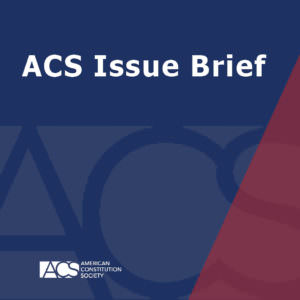Advancing Organ Donation Without Commercialization: Maintaining the Integrity of the National Organ Transplant Act
Executive Director and Founder, Coalition for Organ-Failure Solutions and Visiting Research Associate, Center for Bioethics at the University of Pennsylvania
Director, DC Prisoners' Project of the Washington Lawyers’ Committee for Civil Rights and Urban Affairs

ACS is pleased to distribute an Issue Brief by Dr. Debra Budiani-Saberi, executive director of the Coalition for Organ-Failure Solutions, and Deborah M. Golden, entitled, "Advancing Organ Donation Without Commercialization: Maintaining the Integrity of the National Organ Transplant Act." In this Issue Brief, Dr. Budiani-Saberi and Ms. Golden argue against adoption of the proposed Organ Trafficking Prohibition Act of 2009, which for the first time would give government entities the ability to provide material compensation for organ donation. The authors contend that the bill would irreparably harm the framework for altruistic organ donation that was created by the National Organ Transplant Act of 1984, which strictly prohibits the sale of organs in the United States, and that the legalization of organ sales domestically would also have a disastrous effect on international efforts to eliminate the sale of organs abroad. The authors note that many viable alternatives to material compensation for organ donation are available, eliminating the need to legalize material compensation for organ donation.
Dr. Budiani-Saberi and Ms. Golden explain that Congress enacted the National Organ Transplant Act in 1984 (NOTA) in response to public opinion against organ sales and as a first attempt to regulate the growing practice of organ donation and transplantation in the United States. Because demand for organs today exceeds the supply, some have argued for permitting material consideration for organ donation since NOTA was enacted—proposals have included financial payouts or non-monetary benefits in exchange for an organ, ranging from permitting tax or college tuition credits, job benefits, and shortening the length of prison sentences. The authors claim that the Organ Trafficking Prohibition Act of 2009 (OTPA) currently being circulated by Senator Arlen Specter (D-Pennsylvania) would legalize government compensation of substantial financial benefits. Dr. Budiani-Saberi and Ms. Golden argue that the OTPA would necessarily target the poor by providing inducements for donation, and that material incentives would induce less-than healthy donors to provide their organs. They also contend that the material incentives proposed by the OTPA are likely to not only undermine the altruistic living and deceased donation that the NOTA has encouraged, but will also work directly against international efforts to combat organ trafficking and transplant commercialism.
Dr. Budiani-Saberi and Ms. Golden conclude by noting that organ transplants rely on public trust in medicine that is furthered only by organ donation without remuneration. The authors suggest that alternative avenues that would enhance altruistic organ donation should be pursued rather than legalizing organ sales. The Issue Brief proposes strategies such as improving living donor care, removing disincentives for organ donation, and fostering programs like the Organ Donation Breakthrough Collaborative as ways in which to increase organ donations.
Read the full Issue Brief here: Advancing Organ Donation Without Commercialization: Maintaining the Integrity of the National Organ Transplant Act
